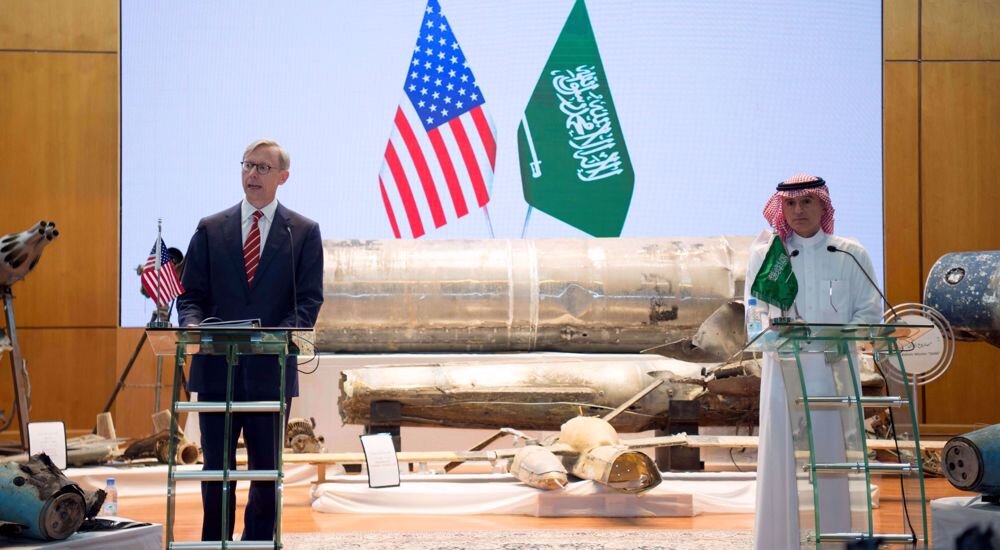Region won’t be secure by following U.S. orders, Tehran tells S. Arabia, Bahrain

TEHRAN — Foreign Ministry spokesman Abbas Mousavi has strongly criticized Saudi Arabia and Bahrain for supporting Washington’s anti-Iran stance, saying stability and security will not be established in the region through obeying the orders of the United States.
“The only way to create stability and security in the region is changing hostile behaviors and moving toward regional cooperation,” Mousavi said on Tuesday, IRNA reported.
He criticized certain regional countries that back the U.S. demand that the United Nations extends arms embargo on the Islamic Republic.
Saudi Minister of State for Foreign Affairs Adel Al-Jubeir and U.S. special representative for Iran Brian Hook on Monday called on the international community to extend the UN embargo on sales of weapons to Iran, accusing Iran of sponsoring terrorism.
Speaking during a joint press conference in Riyadh, Al-Jubeir said Saudi and U.S. policies on Iran are identical.
“We both see Iran as a grave danger not only to regional stability, but international stability,” he said.
“We believe that Iran is the chief sponsor of terrorism and that the international community has to be more firm in dealing with the Iranians and their proxies.”
Mousavi said it is “very surprising that countries such as Saudi Arabia, which, themselves are a source of terrorism and extremism and have fueled instability in the region by supporting terrorist groups like al-Qaeda for years, are leveling groundless accusations against the Islamic Republic of Iran, which has rid the region of terrorist groups with its responsible behavior.”
U.S. envoy Hook visited Saudi Arabia as part of a Mideast tour. Earlier, he paid a visit to Abu Dhabi, the capital of the U.S.-allied United Arab Emirates.
Referring to Hook’s trip to the region, Mousavi said the countries supporting the U.S. stance are “those that have, for more than five years, been killing thousands of people, including Yemeni women and children.”
Foreign Ministry spokesman Mousavi says it is “very surprising that countries such as Saudi Arabia, which, themselves are a source of terrorism and extremism and have fueled instability in the region by supporting terrorist groups like al-Qaeda for years, are leveling groundless accusations against the Islamic Republic of Iran, which has rid the region of terrorist groups with its responsible behavior.”
“It is time that these countries gave up injudicious remarks and blind obedience to the U.S., which is the symbol of oppression and injustice in the world, and came to realize that security cannot be ensured with obedience to the United States,” he stated.
The Riyadh conference also displayed weapons, including drones and missiles, which the Saudis claim to have been supplied by Iran to the Houthis in Yemen to be used against Saudi Arabia.
Hook said, “The weapons that we see here today ... are all the evidence we need that the arms embargo on Iran must not be lifted. We need to ensure that Iran has a harder time spreading deadly weapons.”
“This is a fraction of the kind of deadly arms that have made their way not only here to Saudi Arabia, but around the Middle East, so this is the right time for the Security Council to do the right and necessary thing,” he added.
Later in the day, Hook traveled to Manama, where he issued a joint anti-Iran statement with Bahraini Foreign Minister Abdullatif bin Rashid al-Zayani.
“In recognizing the grave threat posed by Iranian arms transfers in the region, and in Bahrain specifically, the United States and Bahrain call upon the United Nations Security Council to extend the arms embargo on Iran before it expires,” read the statement.
The UN arms embargo on Iran, which was imposed 13 years ago, is due to expire in October under United Nations Security Council (UNSC) Resolution 2231 that endorsed the country's 2015 nuclear deal.
Tensions remain high between Iran and the United States, leading many to fear that a war may be just around the corner.
Earlier on Monday, Tehran said it has asked Interpol to arrest U.S. President Donald Trump at the top of a list of individuals who are responsible for the assassination of Iran’s top general Qassem Soleimani.
“36 individuals who cooperated, collaborated, and participated in the assassination of Hajj Qassem, including political and military authorities of the U.S. and other countries, have been identified,” Tehran Prosecutor General Ali Alqasi-Mehr said,
Their arrest warrant has been issued and announced to Interpol, he said, adding that Trump will be facing prosecution even after his term as president.
In response, Hook said that Iran’s issuance of an arrest warrant for the U.S. president is a “propaganda stunt”.
“Our assessment is that Interpol does not intervene and issue Red Notices that are based on a political nature,” he said.
“This is a political nature. This has nothing to do with national security, international peace or promoting stability ... It is a propaganda stunt that no-one takes seriously,” Hook said.
On January 3, Trump ordered airstrikes that martyred General Soleimani and Abu Mahdi al-Muhandis, the second-in-command of Iraq’s Popular Mobilization Units (PMU), in Baghdad’s international airport.
In the early hours of January 8, the IRGC fired dozens of ballistic missiles at a military airbase hosting U.S. forces in Iraq as part of its promised “tough revenge” for the U.S. terrorist attack.
MH/PA
